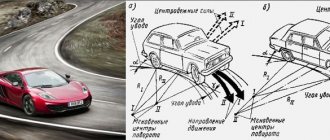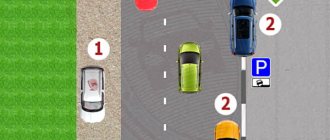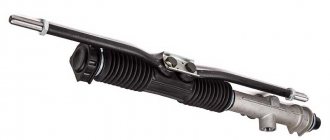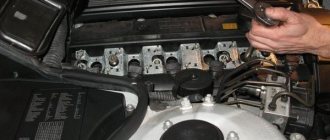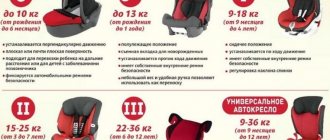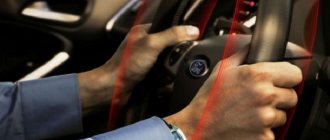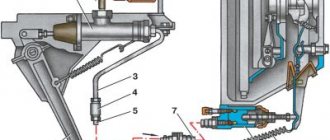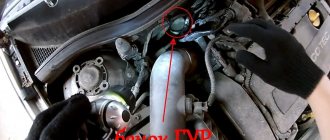Learning to hold and turn the steering wheel of a car correctly is an important problem for a novice driver. By learning this procedure, the car owner will be able to prevent many mistakes that usually lead to traffic accidents, the number of which is constantly increasing in 2022.
This skill should not be neglected; incorrect position of the driver’s hands can contribute to an erroneous maneuver. Experts note that each driver drives a car in his own way: some take the steering wheel with both hands at once, and many steer on the road with one hand. There is also a category of drivers who control the steering wheel with their fingers.
But many people ask, how do you need to rotate the steering wheel correctly so as not to get into an unpleasant situation? The road is a place of high danger; when driving along it, one should not take the traffic situation lightly. Therefore, those who do not know how to drive a car correctly, and especially how to operate the steering wheel, need to learn all the safe techniques. This skill in practice is important above all. These techniques can be learned while driving a car, as well as on an electronic simulator while at home.
How to hold the steering wheel
If you are driving on a straight road, it is better to keep your hands in the 9-15 dial position. To do this, you need to place your left hand at 9 and your right hand at 15. You should hold the steering wheel with both hands. In this way, you can control the movement of the car, create easy control and safe driving. It will be more convenient to use the switches on the steering wheel and the turn levers.
If your car is moving on an asphalt surface, then your thumbs should be placed above the partitions, and when driving on a dirt road, on the partition itself. The steering wheel must be held firmly to ensure good control of movement. But there is no need to grip the steering wheel too much, even during sharp turns. You need to hold it confidently, and not overdo it, otherwise your hands will quickly get tired.
Hand movements can be divided into the following types:
- Working movements (start from the moment you grab the steering wheel, their end is the moment you release the steering wheel).
- Idle movements (they occur during the period when the steering wheel is released, and then until you take it again).
It should be remembered that when picking up the steering wheel, as well as when releasing it, it should not stop.
Useful tips
It is worth listening to experienced drivers and mastering several techniques for gripping the steering wheel. The grip strength can be increased if you use a closed type of holding the “steering wheel”.
Don't squeeze the steering wheel so hard that your fingers turn blue. This way your hands get tired, but this in no way affects the quality of movement. The effort should be moderate, but off-road the force can be increased to hold the steering wheel.
You should never let go of the steering wheel while driving. This is fraught with bad consequences. Regardless of the speed limit, the steering wheel must always be controlled. You need to use two hands.
Found a violation? Report content
Mistakes of novice drivers
The first practice lessons are the most important, but many beginners, due to excitement, make many serious mistakes. The first mistake is returning the steering wheel to its original position after making a turn, despite the steering mechanism, which allows you to automatically return the steering wheel to the position where the car is moving in a straight line. There is no need to turn the steering wheel by hand. When driving, an important task is not to perform unnecessary actions in order to navigate the traffic situation in time.
Popular mistakes made by newbies are:
- Jerking the steering wheel . Your hands should be relaxed and your grip should be soft - these are the main points that should not be forgotten when driving a vehicle. Do not apply much force to the steering wheel when making a turn. In this case, you can sharply enter the turning trajectory, but after a short time of such turns the car will have to be sent for repairs, the tires and suspension will be damaged. If the wheels slip, it will be impossible to drive the car, so you should not be too zealous when turning the steering wheel, and the car will serve you for a long time, and no repairs will be needed.
- The driver hung on the steering wheel . When driving a car, only hand force should be applied to the steering wheel. Muscles that are not currently working should be relaxed. To fulfill these conditions, it is necessary to use a special support designed to rest the left leg, lean more tightly against the back, and be fastened with a belt. With the help of these rules, you will merge as much as possible with the car into one whole.
- Dead grip on the steering wheel . To make a turn on the road, you need to apply some force to the steering wheel, but do not have a death grip on it. You should learn to quickly relax your hands. If you are constantly stressed, the car will not respond well and you will often feel tired while driving.
Taxiing without lifting your hands.
Steering without lifting your hands from the steering wheel rim is a common way to rotate the steering wheel when you need to slightly change the direction of the car and then return the wheels to the “straight” position.
This steering method is used:
- when correcting straight-line movement;
- when smoothly driving around an obstacle;
- when leaving the edge of the roadway or sidewalk;
- when changing lanes into an adjacent lane;
- before stopping.
Steering wheel technique
When you drive a car, you often have to make maneuvers. Such maneuvers can be performed in different ways, depending on the angle of rotation. When sitting behind the wheel, after starting the engine, you need to clasp the steering wheel with your palms, without squeezing it with great force. The left hand should be at 9 o'clock when looking at the clock, and the right hand should be at 3 o'clock. Your elbows need to be slightly bent. This position allows you to quickly respond in case of accidents.
Hands-free operation
If you need to turn the car 45 degrees, you do not need to change the position of your hands on the steering wheel. This is the simplest movement technique. You need to do the following: put your hands on the steering wheel in the position as described above. When changing lanes or overtaking, the steering wheel must be turned in the appropriate direction. At the same time, hands do not take off the steering wheel.
After making a turn, return to the starting position and do not touch the steering wheel. This method is suitable because you do not need to return the wheels to the straight position yourself, everything will happen automatically. But this method cannot be used if you need to make a turn or a turn with a significant turning radius. You will be able to straighten your arms if you wish when they are in the starting position.
Control with interception
If the turn is sharp, then use the method of intercepting the steering wheel. Let's figure out how to correctly grab the steering wheel:
- Place your hands in the starting position.
- Using both hands, slowly twist the steering wheel rim to the left until your left hand touches the corresponding side.
- At this moment, you need to remove your left hand from the steering wheel and turn with your right.
- Then quickly move your left hand along the top edge of your right hand and grasp the steering wheel again.
- When it becomes uncomfortable to turn the steering wheel with your right hand, you need to move it to the top of the steering wheel.
- Then they work in the following order: continue to turn the steering wheel, intercepting it.
- After the vehicle returns to the correct trajectory, immediately level the car. Now you need to rotate the steering wheel to the right using the same method.
To turn right, you don't have to turn the steering wheel with both hands. It is advisable to use only the left hand.
- Do not touch the steering wheel with your right hand.
- Place your left hand above the center of the steering wheel rim, gently squeezing it, and gradually turn to the right.
- When your hand is unable to turn, you need to squeeze the steering wheel with your hand.
- Next, you need to straighten your hand and turn your fingers 180 degrees. At the same time, rest your hand on the steering wheel and continue to rotate it. The task is to return the hand to its original position.
How to turn the steering wheel correctly when turning
The main thing when steering quickly in a turn is not to lose the neutral position and constantly feel the feedback force on the steering wheel. Otherwise, you may not notice the wheels starting to slip and the front part of the car to drift off. This behavior requires immediate correction with a quick return of the steering wheel to a neutral position, for which, during interceptions, changing the places of contact of the hands is not allowed. The situation is complicated by the fact that on cars with a large steering ratio it is necessary to make several interceptions using the method described above on how to correctly turn the steering wheel when turning. And every time you need to feel the zero position of the wheels.
Training in the correct position of the hands and steering is carried out on special simulators or simply on a car with the front wheels hanging out. As a standard, we can take, for example, the time of ten shifts of the steering wheel from lock to lock with impeccable execution technique. A gradual decrease in this indicator will be a good competitive moment for exercises, and you can even find guidelines for example on the Internet.
One-handed operation
It usually happens when driving when one hand is occupied. In such cases, it is useful to be able to steer with one hand. To learn this, you need to squeeze the top of the steering wheel rim with your left hand and control it. Let's look at an example: the right hand is busy. When you release it, you need to put it back on the steering wheel. Procedures with a busy hand must be carried out promptly in order to return it to its place as soon as possible.
In this case, training is an important factor. If you train purposefully, you can learn to drive faster. This is done in a free area, or on a deserted road, where you can try braking, accelerating and turning.
- First we need to conduct experiments. You can start at low speed and accelerate slowly. The speed can be different, and you can compare what force needs to be applied to control a car at high speed and what force at low speed.
- Try turning the steering wheel and pressing the brakes all at the same time. Watch how the car reacts to all manipulations.
- Relax your arms, do not hang on the steering wheel, keep your body in the desired position, and make sure that your body weight does not interfere with movement.
- Use different control methods and combine them with each other.
- If you want to change lanes, you need to find out exactly how the vehicle will behave under your manipulations. First, try changing lanes slowly and then quickly.
- At second speed, try to make a turn, while pressing on the gas pedal, and then coast, releasing the gas. In this position, you need to look at how efficiently the car makes a turn.
Consequences of negligence
In emergency situations, there is no time to change hands and grab the steering wheel. If you position your hands incorrectly, then a quick response in an emergency situation is impossible. In this case, you can provoke an accident or arrange one yourself.
We give a fading orchid a chance: how to grow a new flower from a stump
Planets with hidden oceans may be suitable for life: scientists' opinion
Photo of asteroid 2001 FO32, which successfully flew past Earth
But it should be borne in mind that science does not stand still. Now the steering system is so delicate that it senses the slightest changes. Therefore, hand interceptions are almost never practiced anymore. This way, the rotation of the wheels can be assessed more clearly and the maneuver can be performed smoothly.
If an airbag is built into the steering wheel, then your hands should be placed below the area from which it flies out - this way there is less risk of injury.
Performing a "snake"
To obtain a driver's license, you must successfully pass the theory and practice of driving a car. In practical exams, they usually take the well-known “snake” exercise. It is performed on a site in the shape of a rectangle, consisting of four identical sections in area. The length of these sections is 1.5 times greater than the length of the car, and the width is determined by the length of the car. Naturally, it is advisable to practice somewhere yourself before taking an exam of such an exercise.
On the site you need to install stands from available materials - bags, bottles of water, canisters, etc. A total of six stands are needed: at the start, finish, and intermediate - four. There should be no other cars on the site, so that there is freedom to perform maneuvers in the exercise.
The point of the exercise is to travel this distance along a trajectory similar to a snake. In this case, you must not touch the racks. First you need to drive up to the “start”. Gradually start driving on a straight road. When the car starts moving, you need to fully press the clutch pedal, the car will roll by inertia.
When the first mark on the pillar reaches the middle of the front door of the car, you need to turn the steering wheel to the left, making only one turn. The first post is passed at an angle of 45 degrees.
It is necessary to control the second rack. When it appears on the right side, align the wheels by turning the steering wheel to the right one full turn. Move in a straight line, after reaching the second pillar in the middle of the right front door, make two full turns of the steering wheel to the right. After this, you need to lightly press the gas pedal, release the clutch pedal a little, and move the car forward a little.
After this, you need to press the clutch fully. Next, control the third rack. When approaching and passing its left front fender, align the wheels by turning the steering wheel two turns. Then similar actions are carried out. Some beginners have problems getting to the finish line. This is done using this method.
When the car reaches the 5th pillar and approaches the middle of the left front door, the wheels should be set to move straight ahead, and the steering wheel should be rotated a full turn to the left. Look ahead, when you point the front of the car towards the center, you need to align the wheels with one turn of the steering wheel, turning it to the right. Then you should approach the finish line. Use the 6th rack as a guide. Turn off the speed and put the car on the handbrake. At this point, the “snake” exercise can be considered complete.
The main problem with this exercise is touching the racks. After that, they fall, and you are awarded penalty points. To prevent such facts, you need to drive smoothly, the speed of movement should not change, and you should not press on any pedals. The main task is to rotate the steering wheel in time.
Another mistake when performing a “snake” is: when moving slowly, the novice driver also turns the steering wheel slowly, which, of course, is wrong. You need to turn the steering wheel quickly, but the speed of the car should be low. Every driver must achieve proper steering control. Only a quick reaction on the road, without fuss and panic, will ensure you keep your car intact.
Recommendations
- When driving at high speeds, do not place your thumbs near the spokes of the steering rim. The fact is that if the wheels get into small holes, the steering wheel jerks sharply, and the spokes can knock out the knuckles.
- Do not under any circumstances let go of the steering wheel , as it may spontaneously return to its place; always hold it.
- You can train with the help of special devices for steering. Make a simulator yourself or buy it at a car store.
- While driving, try not to be distracted by external stimuli .
- Learn to steer and drive in a spacious area without any obstacles, and at minimal speeds.
- When turning at a small angle, do not change the position of your hands on the steering rim. Thanks to this, you can quickly return the steering wheel to its original position.
- If you need to turn the steering wheel several turns , grab the steering wheel in the same places. As a result of this, you will rotate the steering wheel as easily as possible, and it will also be easier for you to return it to its original position.
- Do not combine the process of driving the steering wheel with other activities.
- Do not hold the steering wheel with one hand while holding the gear shift lever with the other. A similar situation can often be observed among drivers with extensive driving experience. The habit of holding the steering wheel using this method is acquired over time. It is worth recognizing that experienced drivers can afford this style of driving, since they have been taught by life to correctly assess the situation on the road, so they will be able to anticipate the emergence of many dangerous situations. However, a beginner who holds the steering wheel with one hand may not have time to react to the danger that has arisen, and therefore he must grab the steering wheel with both hands.
So, you should control the steering wheel as correctly as possible, since your life and that of other road users may depend on it.
Subscribe to our Telegram channel https://t.me/pravoauto to stay updated on new fines and other changes in automobile legislation.
Reverse steering control
Our roads have many shortcomings, but in winter there is also ice and snow, which often leads to skidding of the vehicle. The car may skid due to the driver's careless movement on a slippery road. In such situations, rear-wheel drive cars are considered the most dangerous, but this unpleasant moment can also occur in a front-wheel drive car.
If a skid occurs, then you need to remain calm and not panic. Further, in order to bring the car out of this state, you need to perform some automatic actions, which should be developed through many years of driving.
Which direction should you turn the steering wheel when skidding a front-wheel drive car? The steering wheel must be turned in the direction of the skid and the gas must be increased. An important factor is that the driver can feel the moment of skidding. The main task is to operate the steering wheel. In this case, you cannot change gears or brake. It is forbidden to use the handbrake, this will increase the risk of skidding. The car will turn around and an accident may occur.
Where should you turn the steering wheel when skidding in a rear-wheel drive car? In this case, the steering wheel is also rotated in the direction of the skid, and the gas is released. It is also prohibited to press the clutch, change gears or use the brakes.
For an all-wheel drive vehicle, getting out of a skid is more difficult. Most often you just have to wait for the car to stop on its own. You can only turn the steering wheel slightly in the direction of the skid and do not add gas.
General rules
The first and most important rule is that you cannot remove both hands from the steering wheel while the car is moving. Even if the road surface seems perfectly smooth and the car is in perfect working order, the slightest damaged section can cause a serious accident. If there is an unauthorized change in the vehicle's trajectory, it is important to be able to correct it in virtually a split second. When your hands are busy with anything but the steering wheel, this is impossible to do.
What is also very important is that you cannot turn the steering wheel of a stationary car with the engine turned off. Thus, it is very easy to break the mechanism that is responsible for turning the wheels. In addition, rapid tire wear is guaranteed. An adult is unlikely to abuse such actions, but children certainly will. Therefore, you should not let your child drive a car, including without the key in the ignition.
Parallel parking
Proper parking of a car in a city is an important point. At the training track it is impossible to accurately repeat all the moments that arise in real life. It is better to try to find a place for the car to park in front.
Parallel parking is performed as follows:
- Line up with the car located next to you, stand parallel, maintaining a distance of 1 meter.
- Determine where to turn safely.
- Drive in reverse until the mental mark reaches the edge of the car on the right.
- Turn the steering wheel all the way to the right, drive in reverse until the right edge of the car is visible, and stop.
- Turn the steering wheel to its original position and move further back until the car in front is visible.
- Turn the steering wheel all the way to the left and move backwards until the car is parallel to the curb.
- Level the machine and position it so that it is equidistant from other machines.
